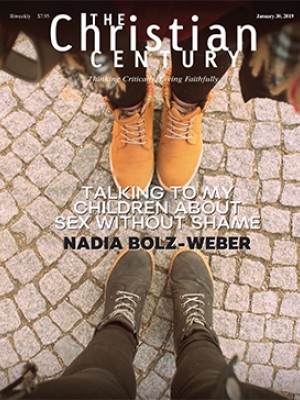Biblical friendship in an age of loneliness
Facebook tells me I have 633 friends. Sirach tells me how few of those are faithful friends.

I have exactly 633 friends. Facebook tells me so.
Despite these friends, several months ago I woke up feeling desperately lonely. I could hardly sleep, and when I did it was short and fitful. I had arrived at midlife tired, disconnected, and immensely sad. Each day I turned to Facebook looking, I suppose, for a lift. I wanted to feel like I somehow mattered.
What I found instead were my friends having the most remarkable time. Stunning birthday celebrations, creative birth announcements, wild adventures to unknown corners of the world: my 633 friends were making the most of life while I sat looking at my screen and feeling diminished.
Read our latest issue or browse back issues.
I’m not alone, however. A recent Cigna study places loneliness at the root of an emerging health crisis. Twenty-seven percent of Americans rarely or never feel understood, while two in five sometimes or always feel their relationships are not meaningful. There are physical ailments linked with loneliness, too. According to one meta-analysis, loneliness increases our odds of dying early by 45 percent.
Taking our loneliness epidemic seriously might start with a reorientation to social media. We have to acknowledge that while such platforms can make us aware of the happenings of acquaintances near and far, they are not the best avenues for connection and care. Nor are they venues for cultivating mutual vulnerability and trust, key components of the antidote for loneliness and disconnection: true friendship.
In the Wisdom literature of the Hebrew Bible, the writer Ben Sira stresses the lessons of experience. He includes this explanation of friendship:
Faithful friends are a sturdy shelter:
whoever finds one has found a treasure.
Faithful friends are beyond price;
no amount can balance their worth.
Faithful friends are life-saving medicine;
and those who fear the Lord will find them. (Sirach 6:14–16)
This passage follows a contrasting series of statements about false friends, such as those who are looking only for praise, those who can morph quickly into enemies, and those who will eat with you but will not remain in times of trouble. These kinds of friends, says Ben Sira, are easy to find. But those who are wise will find instead faithful friends. In my experience, such friends are the face of God.
Faithful friends are a sturdy shelter. When I was at my lowest and feeling desperately alone, a friend became my shelter. In 2016 my father died suddenly, followed three months later by the death of my father-in-law. The same year, my husband experienced an extended health crisis, and our dog—my daily walking partner and an important source of unconditional love—died while we were out of town. The rounds of loss became overwhelming. I didn’t realize it then, but in the midst of my grief, I was desperate for connection and belonging, hallmarks of true friendship.
My journey out of despair came through someone who knew how to share my burdens. She recognized that the load was too heavy for me to carry on my own, and she offered to shoulder the weight for me. This friend listened as I peeled back layer after layer of my life. She acted as my confessor, absolving me of burdens I had carried way too long and offering an occasional word of advice, insight, or affirmation. She gave me permission to be the person I wanted to be, to become free from society’s expectations. She enabled me to feel heard and understood, and in the process I began to remember my self, the one I had ignored and dishonored with each accommodation to others.
Another way this friend gently protected me involved sharing music to help me heal. The words of Carrie Newcomer’s song “Sanctuary” captured the sense of comfort I felt in my friend’s presence: “Will you be my refuge, my haven in the storm? / Will you keep the embers warm when my fire’s all but gone?”
Our world touts self-sufficiency as the measure of achievement. Ben Sira would say that this is folly. We need faithful friends who will provide us shelter in the storms of life, a place where we can take off our shoes and stay until we are fortified to face the elements of our lives.
Faithful friends are beyond price. The wisdom teacher also advises that friendship is worth more than we can imagine. In our time of fleeting photos and “likes,” is it any wonder we have lost sight of what wholehearted friendship is and what it’s worth? Friends double our joy and divide our sorrow, says the old proverb, too easily dismissed today.
I am fascinated by the biblical friendship between Naomi and Ruth.
It is unconventional, this friendship between a mother-in-law and her dead son’s widow. It requires extraordinary courage and the willingness to cross boundaries and commit to an unforeseen future. And it points to the potential of valuing a person over differences of ethnicity or borders.
I wonder if we are ready to reconsider our lack of deep connection with others. Wisdom teaches us that our efforts in doing so are beyond price.
Faithful friends are life-saving medicine. Loneliness can have devastating health consequences. Ben Sira instructs that friends are medicine—faithful friends, that is. We are not talking about casual or haphazard friends but deep, intentional, never-going-to-let-go kinds of relationships.
Such friendships do not mature on their own. Having lived on a farm when I was young, I know that soil must be prepared prior to planting. Placing a seed in parched and nutrient-deficient soil will result in crops that wither and die. So too with friendships. Brené Brown talks about the need for “excruciating vulnerability” as the birthplace of love, belonging, joy, and empathy. Without vulnerability, wholehearted friendships will not have staying power.
I was not ready to be vulnerable with my friend until she was first vulnerable with me. Feelings of shame and unworthiness had worked their way deep within my bones, convincing me that I did not deserve attention and connection. As a result, I had largely cut myself off from deep connection with others. When this heretofore casual friend called me to talk about a specific challenge in her life, all of a sudden the logjam in the depth of my being broke free. In our shared exposure and honesty, we created a new level of knowing and being. It was a welcome surprise that neither of us had sought.
This new friendship needs to be cultivated, just like the planted seed. Time and commitment are necessary. Although we live in distant states, we talk and email regularly. We take time to ask about each other’s lives and to listen, seeking to hear what is in the pauses just as much as what is said. When one is burdened in some way, the other is praying and supporting. The time we invest in our relationship has affected our lives; we each have rearranged our schedules to accommodate it. Nurturing this kind of wholehearted friendship requires changes and sacrifices.
When loneliness is an epidemic, such actions seem the only wise choice.
Those who fear the Lord will find faithful friends. When Ben Sira says this, I imagine he is suggesting that when we open ourselves to others, to the possibility of profound connection with another human being, God’s blessing pours over and through us. When spirit touches spirit we experience with tangible evidence the dream of God: deep, abiding love. As Desmond Tutu once intimated, God created us with our differences with the hope that we could learn to love each other. Surely now more than ever we need to learn this lesson.
A version of this article appears in the print edition under the title “Faithful friends.”





